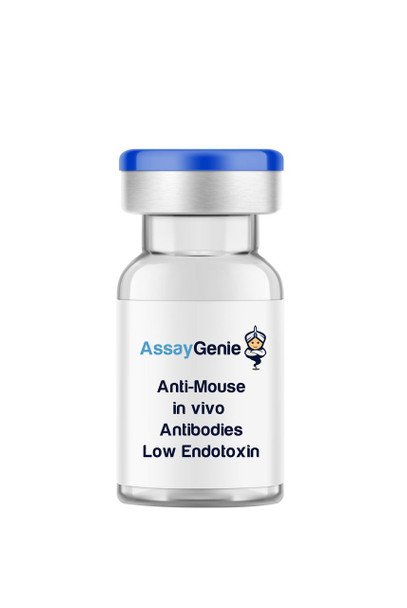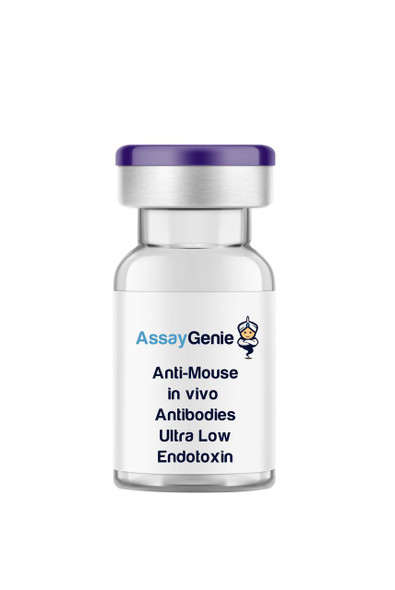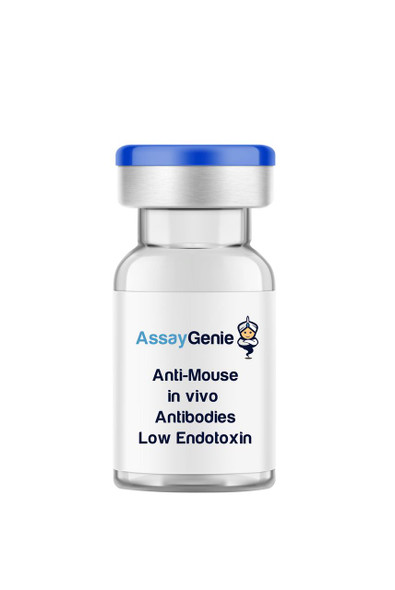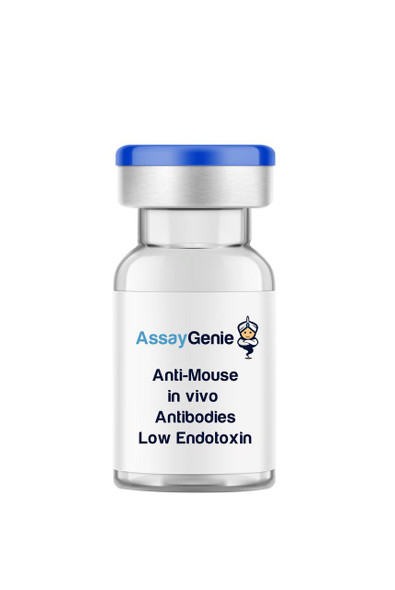Anti-Mouse CD370 In Vivo Antibody - Low Endotoxin
- SKU:
- IVMB0169
- Product Type:
- In Vivo Monoclonal Antibody
- Clone:
- 1F6
- Protein:
- CD370
- Isotype:
- Rat IgG1
- Reactivity:
- Mouse
- Synonyms:
- CD370
- Synonyms:
- DNGR-1
- Synonyms:
- C-Type Lectin Domain Family 9 Member A
- Research Area:
- Immune Checkpoint & Cancer Biology
- Endotoxin Level:
- Low Endotoxin
- Host Species:
- Rat
- Applications:
- FC
- Applications:
- IF
- Applications:
- WB
Description
| Product Name: | Anti-Mouse CD370 In Vivo Antibody - Low Endotoxin |
| Product Code: | IVMB0169 |
| Size: | 1mg, 5mg, 25mg, 50mg, 100mg |
| Clone: | 1F6 |
| Protein: | CD370 |
| Product Type: | Monoclonal Antibody |
| Synonyms: | CD370, DNGR-1, C-Type Lectin Domain Family 9 Member A |
| Isotype: | Rat IgG1 |
| Reactivity: | Mouse |
| Immunogen: | RBL-2H3 cells expressing mouse DNGR-1 fused to an HA epitope |
| Applications: | FC, IF, WB |
| Formulation: | This monoclonal antibody is aseptically packaged and formulated in 0.01 M phosphate buffered saline (150 mM NaCl) PBS pH 7.2 - 7.4 with no carrier protein, potassium, calcium or preservatives added. |
| Endotoxin Level: | < 1.0 EU/mg as determined by the LAL method |
| Purity: | ≥95% monomer by analytical SEC >95% by SDS Page |
| Preparation: | Functional grade preclinical antibodies are manufactured in an animal free facility using only In vitro protein free cell culture techniques and are purified by a multi-step process including the use of protein A or G to assure extremely low levels of endotoxins, leachable protein A or aggregates. |
| Storage and Handling: | Functional grade preclinical antibodies may be stored sterile as received at 2-8°C for up to one month. For longer term storage, aseptically aliquot in working volumes without diluting and store at -80°C. Avoid Repeated Freeze Thaw Cycles. |
| Applications: | FC, IF, WB |
| Recommended Usage: | FC WB |
| Reactivity: | Mouse |
| Host Species: | Rat |
| Specificity: | This clone 1F6 monoclonal antibody recognizes a direct epitope on mouse DNGR1/CLEC9A for CD8+ dendritic cells, which can be exploited for tumor therapy, whilst also recognizing necrotic cells. This antibody can recognize both the short and long isoform of DNGR-1, which varies in a segment of the stalk region. |
| Antigen Distribution: | CD370 (CLEC9A) in mice is expressed on CD8+ DCs and at low levels by plasmacytoid DCs |
| Immunogen: | RBL-2H3 cells expressing mouse DNGR-1 fused to an HA epitope |
| Concentration: | ≥ 5.0 mg/ml |
| Endotoxin Level: | < 1.0 EU/mg as determined by the LAL method |
| Purity: | ≥95% monomer by analytical SEC >95% by SDS Page |
| Formulation: | This monoclonal antibody is aseptically packaged and formulated in 0.01 M phosphate buffered saline (150 mM NaCl) PBS pH 7.2 - 7.4 with no carrier protein, potassium, calcium or preservatives added. |
| Preparation: | Functional grade preclinical antibodies are manufactured in an animal free facility using only In vitro protein free cell culture techniques and are purified by a multi-step process including the use of protein A or G to assure extremely low levels of endotoxins, leachable protein A or aggregates. |
| Storage and Handling: | Functional grade preclinical antibodies may be stored sterile as received at 2-8°C for up to one month. For longer term storage, aseptically aliquot in working volumes without diluting and store at -80°C. Avoid Repeated Freeze Thaw Cycles. |
CLEC9A antibody, 1F6, recognizes C-type lectin domain family 9 member A (CLEC9A), also known as CD370 and DNGR-1. CLEC9A is a type II transmembrane glycoprotein that belongs to the C-type lectin superfamily. In mice and humans, CLEC9A is expressed by CD8a+ conventional dendritic cells (cDCs) in mice1,2 and BDCA3+ DCs in humans3, which are specialized for the cross-presentation of exogenous antigens on MHC class I4. In mice, type I interferon (IFN)-secreting plasmacytoid DCs (pDCs) also express CLEC9A2. The ligand for CLEC9A is filamentous actin exposed on apoptotic cells5,6, and ligation of CLEC9A results in the cross-presentation and induction of CD8 T cell responses. CLEC9A is a target for vaccine enhancement, and antibodies targeting CLEC9A in vaccination studies lead to enhanced presentation by DCs, eliciting CD8 and CD4 T cell proliferation and strong humoral immunity. In addition, antigen targeting DCs via CLEC9A can enhance anti-tumor immunity12.
| Technical Datasheet: | View |
| Protein: | CD370 |
| Research Area: | Immunology, Innate Immunity |
Meet the team!
Shane Costigan
Territory Manager & Team Lead
Abdul Khadim
Sales Executive







